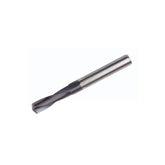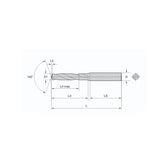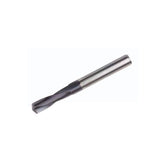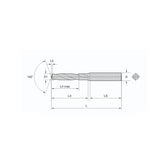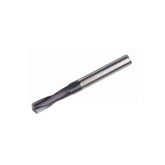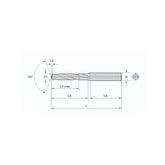Carbide Drill Bits vs. HSS Drill Bits: A Comprehensive Guide
Carbide Drill Bits vs. HSS Drill Bits: A Comprehensive Guide
Drilling is a critical process in industrial projects, and selecting the right tool is essential to avoid poor results, wasted time, and costs. The base material of a drill bit significantly impacts performance, cost, machine setup, and workpiece compatibility. Below, we compare two widely used options: High-Speed Steel (HSS) and Carbide Drill Bits.
What is a High-Speed Steel (HSS) Drill Bit?
HSS drill bits, among the oldest in metalworking, are made from carbon steel, tungsten, and other alloys. They offer cost-effectiveness for applications like drilling steel, stainless steel, cast iron, and more.

Why Choose HSS Drill Bits?
- Ideal for manual machinery or cost-sensitive operations.
- Suitable when carbide is too expensive or impractical for manual use.
Advantages of HSS Drill Bits
- Versatility: Works on wood, plastic, aluminum, mild steel, cast iron, and stainless steel.
- Cost-Effective: More affordable than carbide, with extended tool life and regrinding capability.
- Heat Resistance: Maintains cutting performance at high speeds and dissipates heat effectively.
- Toughness & Flexibility: Less prone to breakage when encountering obstacles during drilling.
Disadvantages of HSS Drill Bits
- Speed Limitations: Slower cutting speeds on hardened or abrasive materials, reducing efficiency.
- Durability: Wears faster than carbide in heavy-duty tasks or abrasive materials.
- Precision Limitations: Less suitable for high-precision or small-hole drilling due to larger drill points.
What is a Carbide Drill Bit?
Carbide drill bits are crafted from tungsten carbide, an ultra-hard material, and excel in drilling hardened steels, stainless steel, cast iron, and abrasive composites.

Advantages of Carbide Drill Bits
- Exceptional Hardness: Effortlessly drills hardened steels, stainless steel, cast iron, and abrasive materials.
- Superior Heat Resistance: Retains performance under extreme temperatures, ideal for high-speed or prolonged drilling.
- Precision & Accuracy: Delivers cleaner, more precise holes with sharp cutting edges.
- Material Versatility: Handles both hard and soft materials, eliminating frequent bit changes.
Disadvantages of Carbide Drill Bits
- Higher Cost: Priced significantly above HSS due to materials and manufacturing.
- Brittleness: Prone to chipping under excessive force or improper use.
Alternative Drill Bit Materials
Powder Metallurgy (PM) Drill Bits:
- Combines carbide-like performance with HSS toughness.
- Ideal for unstable machining conditions (CNC/manual machines), offering durability and cost efficiency.
- Low risk of chipping; suitable for steel, stainless steel, cast iron, and hard-to-machine materials.
Conclusion
- Choose HSS Drill Bits for affordability, versatility, and general-purpose projects.
- Opt for Carbide Drill Bits when drilling hardened materials, prioritizing precision, or requiring extended sharpness.
- Consider PM Drill Bits as a mid-range option for longer tool life than HSS without the cost of carbide.
By aligning your choice with project requirements and material demands, you can optimize efficiency, accuracy, and cost-effectiveness in drilling operations.
Conclusion
- Choose HSS Drill Bits for affordability, versatility, and general-purpose projects.
- Opt for Carbide Drill Bits when drilling hardened materials, prioritizing precision, or requiring extended sharpness.
- Consider PM Drill Bits as a mid-range option for longer tool life than HSS without the cost of carbide.
By aligning your choice with project requirements and material demands, you can optimize efficiency, accuracy, and cost-effectiveness in drilling operations.
